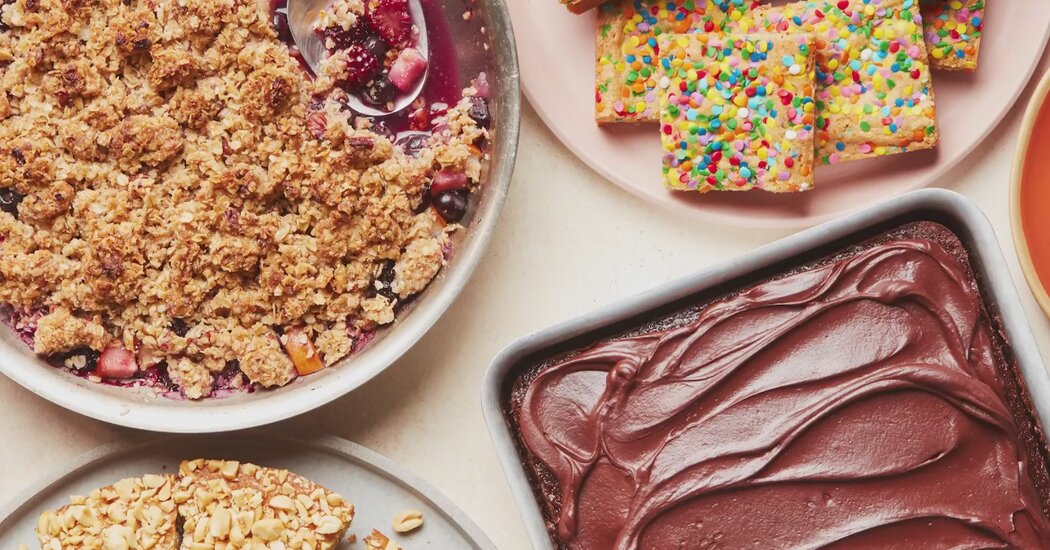The poet Emily Dickinson was an avid baker, and, on the back of a recipe card for coconut cake, she wrote these opening lines:
The Things that never can come back, are several —
Childhood — some forms of Hope — the Dead —
But while her gifts as a poet are clear here, she expresses the opposite of what baking can do. A birthday cake brings back the joy of childhood, maybe even raises hope, and baking beloved recipes from the deceased resurrects memories of them.
Even if the goal isn’t reclaiming what’s lost, the simple act of baking can conjure unexpected delight. When you’re preparing a meal and starting with salmon and potatoes, you end up with cooked salmon and potatoes. But when you’re baking, you start with a slew of powders, golden butter and an egg, and you end up with crackly-edged, chewy blondies.
If you’re a beginner in the kitchen, baking is an ideal entry point. Unlike cooking, there’s no pressure to make food that’s meant to sustain, no urgency from step to step. You can go at your pace, and the process can even feel relaxing. These five foolproof recipes are the best place to start: They require only a handful of tools and ingredients — and no experience. They welcome other seasonings and flavors, and guarantee something tasty. Make them all to learn the basics of baking, or try any one that appeals to you. Not only are they easy, but they also offer the satisfaction of dessert and the wonder at having made it yourself.
Baking Supplies for Beginners
To make all five of these recipes, you need only:
• A sheet pan
• An ovenproof skillet
• An 8-inch square cake pan
• Two bowls
• A whisk
• A silicone spatula
• A set of dry measuring cups
• A set of dry measuring spoons
Start with just a handful of tools.
You don’t have to invest in an expensive electric mixer, stacks of pans or a kitchen scale. Danielle Sepsy, the chef and owner of the Hungry Gnome Bakery, remembers a childhood of standing on a stool next to her grandmother Rosemarie Marullo, who scooped flour with a coffee cup. Ms. Sepsy doesn’t recommend trying this at home and uses a scale at her bakery, but said, “If you have trusty measuring cups on hand, you’re OK.”
In fact, you can use dry measuring cups for liquids even though it’s a little tricky to not spill with them. (Liquid measuring cups don’t work for measuring dry ingredients, though.)
Shop for basic ingredients.
Baked goods can incorporate everything from chiles to miso, but their foundation requires only a small group of essentials. Baking can be traced back to ancient civilizations, but the sweets here come from the style that spread from Europe to America and the world, built on flour, baking powder, baking soda, sugar, salt, butter or oil, and, usually, eggs. Often, other dairy products or flavorings like vanilla extract and cocoa powder are used, and sometimes, not all of the basics are even necessary.
Bask in the precision.
Baking can be perceived as stressful because it requires following a recipe, but that’s what can make it feel calming. “I actually have a lot of anxiety, and I started baking because it gave me a sense of control,” Ms. Sepsy said. “If you follow the recipe exactly, it’ll result in exactly what you want.” Even though she now weighs ingredients to run her professional kitchen, she uses regular measuring cups at home because it makes baking “more stress-free and fun.”
For simple baked goods like these, it’s fine if you end up adding a little too much flour or don’t beat the eggs enough. As long as you’re mixing and baking sugar, fat and starches as described in the instructions, you’re going to end up with something delicious.
Yes, you can personalize baking recipes.
Some cooks don’t like baking because there doesn’t seem to be room for improvisation without risking a failure in the oven. Don’t mess with the base formula for the batter or dough, but do customize seasonings that don’t affect baking chemistry. Stir in different spices like cardamom or ras el hanout and add your choice of toppings or mix-ins. When making fruit desserts, use what’s in season (and on sale).







